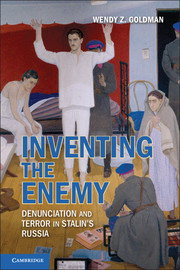Book contents
Conclusion: A History without Heroes
Published online by Cambridge University Press: 05 June 2012
Summary
N. S. Khrushchev stood at the rostrum at the Twentieth Party Congress, in 1956. He spoke at length about Stalin's crimes and the terror he had perpetrated against the Soviet people. Suddenly, a voice called out from the vast hall, “And what did you do, Comrade Khrushchev, when all of this happened?” Khrushchev stopped speaking and looked out over the seated delegates. “Who said that?” he demanded. The delegates froze. No one said a word. Khrushchev paused for a long moment as he surveyed the silent crowd. “That's what I did,” he said. “Exactly what you are doing now.”
– Soviet-era anecdoteParty members, workers, shop heads, engineers, managers, and others in the factories became both agents and victims of a political culture bent on identifying and destroying enemies. No one in the factories was able to escape this culture. After each of the Moscow trials, workers attended mass demonstrations, factory-wide meetings, and small group discussions in the barracks and the shops. Radio loudspeakers in the factories blared news of the trials. Workers across the country took mass, public pledges to examine every industrial bottleneck and accident for signs of wrecking. The factory newspapers functioned as small motors of terror, informing workers and party activists of accusations and spurring them to investigate specific shops and individuals. The leaders of the factories were regularly humiliated in the press. Each day brought new, shocking headlines that set employees abuzz. At the same time, NKVD arrests affected the leadership of the factories at every level. Every director, organizer, instructor, shop and department head, engineer, and foreman, whether party member or not, had associational ties to others above and below. Arrests rippled outward to envelop the victims’ associates, friends, and relatives, at work and at home.
- Type
- Chapter
- Information
- Inventing the EnemyDenunciation and Terror in Stalin's Russia, pp. 298 - 314Publisher: Cambridge University PressPrint publication year: 2011



